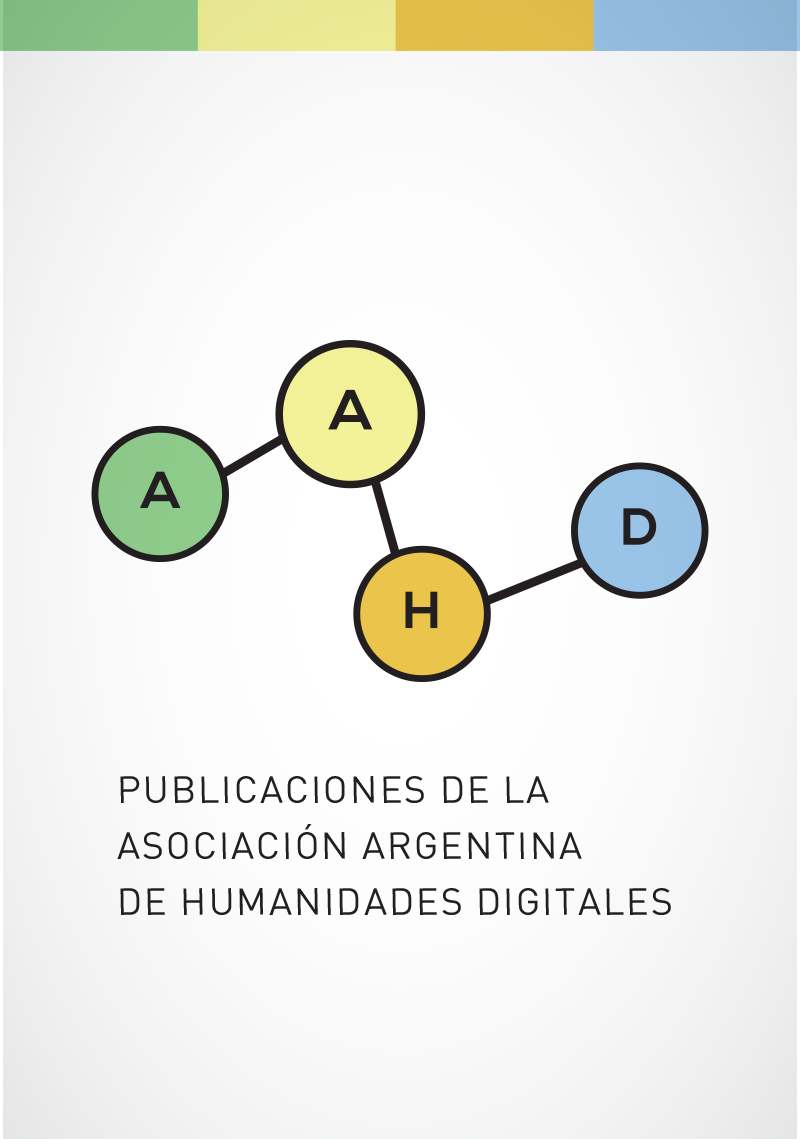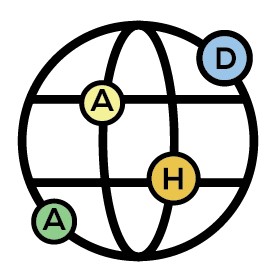Digital Narratives of COVID-19 on Twitter: From Data to Interpretation
DOI:
https://doi.org/10.24215/27187470e002Keywords:
Twitter, Data, Narratives, Data Mining, Sentiment AnalysisAbstract
The bilingual project Digital Narratives of COVID-19 brings together researchers, programmers, and students from the University of Miami and CONICET (Argentina). DHCovid aims to analyze and interpret Twitter data (in English and Spanish) on the SARS-CoV -2 global pandemic from the end of April 2020 to May 2021, through quantitative methods and tools used in the field of DH. This article explores the different methods and tools that the project has used, from basic search platforms and semi-automated textmining to more complex and more or less supervised ones. The paper additionally discusses how this set of tweets was collected to study the narratives and emerging issues about the pandemic in South Florida and specific Spanish-speaking countries (Argentina, Mexico, Peru, Colombia, Ecuador, Spain). Furthermore, it presents the GitHub and Zenodo data repository as well as some of the tools developed by the project.
Finally, work with data mining, frequency analysis of terms and concordances, and topic modeling will be exhibited.
Downloads
References
Abdo, M. S., Alghonaim, A. S., y Essam, B. A. (2020). Public perception of COVID-19’s global health crisis on Twitter until 14 weeks after the outbreak. Digital Scholarship in the Humanities, fqaa037. https://~.com/fqaa037.pdf?~U
Aiden, E., Michel, J. B. (2013). Uncharted. Big Data as a Lens on Human Culture. Penguin Group.
Allés Torrent, S., del Rio Riande, G., Hernández, N., Bonnell, J., Song, D., y De León, R. (2020). Digital Narratives of Covid-19: a Twitter Dataset (Version 1.0) [Data set]. Zenodo. http://doi.org/10.5281/zenodo.3824950
Allyn, B. (2020). Researchers: Nearly Half of Accounts Tweeting About Coronavirus Are Likely Bots. NPR.Org, May 20, 2020. https://www.npr.org/~researchers-nearly-half-of-accountstweeting- about-coronavirus-are-likely-bots
Banda, J. M., Tekumalla, R., Wang, G., Yu, J., Liu, T., Ding, Y., Artemova, K., Tutubalina, E., y Chowell, G. (2021). A Large-Scale COVID-19 Twitter Chatter Dataset for Open Scientific Research - An International Collaboration [Data set]. Zenodo. https://doi.org/10.5281/ZENODO.4460047
Chen, E., Lerman, K., y Ferrara, E. (2020). Tracking Social Media Discourse about the Covid-19 Pandemic: Development of a Public Coronavirus Twitter Data Set. JMIR Public Health and Surveillance, 6(2), e19273. https://doi.org/10.2196/19273
Grainge, P. (2011). Ephemeral Media: Transitory Screen Culture from Television to YouTube. British Film Institute.
Grandjean, M. (2016). A Social Network Analysis of Twitter: Mapping the Digital Humanities Community. Cogent Arts y Humanities, 3(1). https://doi.org/10.1080/23311983.2016.1171458
Jockers, M. L. (2013). Macroanalysis: Digital Methods y Literary History. University of Illinois Press.
Kerchner, D., y Wrubel, L. (2020). Coronavirus Tweet Ids [Data set]. Harvard Dataverse. https://doi.org/10.7910/DVN/LW0BTB
Lamsal, R. (2020). Coronavirus (COVID-19) Tweets Dataset [Data set]. IEEE. https://doi.org/10.21227/781w-ef42
Manovich, L. (2009). Cultural Analytics: Visualizing Cultural Patterns in the Era of ‘More Media’. http://manovich.net/index.php/projects/cultural-analytics-visualizing-cultural-patterns
Moretti, F. (2005). Distant Reading. London: Verso.
Quan-Haase, A., Martin, K., y McCay-Peet, L. (2015). Networks of Digital Humanities Scholars: The Informational and Social Uses and Gratifications of Twitter. Big Data y Society, 2(1). https://doi.org/10.1177/2053951715589417
Schofield, A., Magnusson, M., Thompson, L., y Mimno, D. (2017). Understanding text pre-processing for latent Dirichlet allocation. In Proceedings of the 15th conference of the European chapter of the Association for Computational Linguistics (Vol. 2, pp. 432-436). https://www.cs.cornell.edu/~xanda/winlp2017.pdf
Stefanidis, A., Vraga, E., Lamprianidis, G., Radzikowski, J., Delamater, P. L., Jacobsen, K. H., Pfoser, D., Croitoru, A., y Crooks, A. (2017). Zika in Twitter: Temporal Variations of Locations, Actors, and Concepts. JMIR Public Health and Surveillance, 3(2), e22. https://doi.org/10.2196/publichealth.6925
Downloads
Published
How to Cite
Issue
Section
License
Copyright (c) 2020 Susanna Alles Torrent, Gimena del Rio Riande, Romina De León, Marisol Fila, Nidia Hernández, Jerry Bonnell, Dieyun Song

This work is licensed under a Creative Commons Attribution-ShareAlike 4.0 International License.
Los autores que publican en esta revista están de acuerdo con los siguientes términos:
- Los artículos publicados en la revista se encuentran disponibles en acceso abierto.
- Los autores conservan los derechos de autor y garantizan a la revista el derecho de ser la primera publicación del trabajo al igual que licenciarlo bajo una Licencia Creative Commons Atribución-CompartirIgual 4.0 Internacional (CC BY-SA 4.0), que permite copiar y redistribuir el material en cualquier medio o formato y remezclar, transformar y construir a partir del material bajo los siguientes términos: debe dar crédito de manera adecuada, brindar un enlace a la licencia, e indicar si se han realizado cambios.
- Los autores pueden depositar el trabajo en un repositorio de preprints, postprints, establecer por separado acuerdos adicionales para la distribución no exclusiva de la versión de la obra publicada en la revista (por ejemplo, situarlo en un repositorio institucional o publicarlo en un libro), con un reconocimiento de su publicación inicial en esta revista.
- Se alienta a los/as autores/as a realizar el depósito de datos en SEDICI, o en cualquier otro repositorio de datos de investigación (como Zenodo, donde la AAHD ha creado un repositorio temático para HUMANIDADES DIGITALES), de manera previa a realizar el envío de la contribución a la revista. De este modo, al remitir el artículo solo se deberá indicar la URL donde se encuentran los datos de investigación.


























